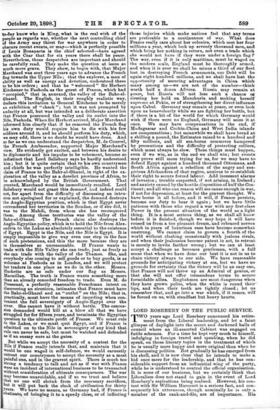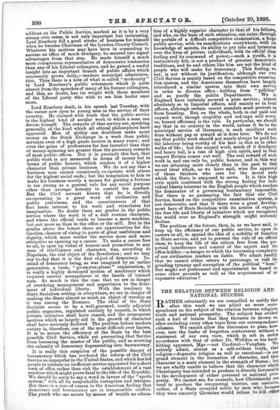LORD ROSEBERY ON THE PUBLIC SERVICE.
TWO years ago Lord Rosebery announced his retire- ment from the Liberal leadership, and let a faint glimpse of daylight into the secret and darkened halls of council where an ill-assorted Cabinet was engaged on futile schemes. For a time he kept very much to himself, indulging in foreign travel and speaking, when he did speak, on those literary topics in the treatment of which he is usually more happy and more original than when he is discussing politics. But gradually he has emerged from his shell, and it is now clear that he intends to make a. bid once more for the leadership, and that he has con- siderable support from an influential wing of the party, while he is understood to control the official organisation. It is none of our business, but we certainly think that Liberalism does not stand to gain in the event of Lord Rosebery's aspirations being realised. However, his con- test with Sir William Harcourt is a serious fact, and con- sequently his utterances, though nominally he is only a. member of the rank-and-file, are of importance. His address on the Public Service, marked as it is by a very strong civic sense, is not only important but interesting. Lord Rosebery did a good stroke of business for himself when he became Chairman of the London County Council. Whatever his motives may have been in consenting to assume an office of much drudgery, he secured two signal advantages from that step. He made himself a much more conspicuous representative of democratic tendencies than any of his Liberal colleagues, and he gained a useful insight into an important branch of public affairs which necessarily grows daily,—modern municipal administra- tion. Thus there is a note of what is called " modernity " in Lord Rosebery's public utterances which is quite absent from the speeches of many of his former colleagues, and this, no doubt, has its weight with those members of the Liberal party who wish to see him leader once more.
Lord Rosebery dealt, in his speech last Tuesday, with the career now open to young men in the service of their country. He claimed with truth that the public service is the highest kind of secular work to which a man can .devote himself. The rewards of that service are, speaking generally, of the kind which all ethical philosophers have approved. Men of ability can doubtless make more money on the Stock Exchange in a week than public servants even of a high grade receive in many years ; and even the gains of professions far less lucrative than that of money-spinning are greater than the pecuniary rewards of most public offices. But it is precisely this fact, that public work is not measured in terms of money but in terms of public honour, which renders it of a higher character than private business. We do not say that a business man cannot consciously co-operate with others for the highest social ends ; but the temptation to him to make his business merely a means for gaining a fortune is too strong as a general rule for any moral purpose other than average honesty to control his conduct.
But the Civil servant knows that he is directly co-operating in a great work of civilisation and public usefulness, and the consciousness of that fact lends interest to his work and stimulates his imagination. No doubt there are grades in the public service where the work is of a dull routine character, and where the official tends to become a mere machine, but not more so than in the office or the mill. But in the grades above the lowest there are opportunities for dis- tinction, chances of rising to posts of great usefulness and dignity, which must render the service more and more attractive as opening up a career. To make a career free to all, to open up vistas of honour and promotion to any man of intelligence and character, was, according to Napoleon, the real object of the Revolution ; and we may say to-day that it is the first object of democracy. In- stead of democracy being, as was imagined by an earlier generation, a loose, " go-as-you-please " organisation, it is really a highly developed system of machinery which requires careful management at the hands of trained men. So much is this the case that we are in danger of overdoing management and supervision to the detri- ment of individual liberty. With the tendency to State Socialism setting in everywhere, we are in danger of making the State almost as much an object of worship as it was among the Romans. The ideal of the State Socialist seems to be a well-groomed, neatly adjusted public organism, regulated entirely by experts, in which private initiative shall have ceased, and the consequent motives which so largely aid in the growth of character shall have seriously declined. The problem before modern society is, therefore, one of the most difficult ever known. It is to secure the efficiency of the State by the best possible Civil Service, while yet preventing that Service from becoming the master of the public, and so averting 'the calamity of democracy degenerating into bureaucracy.
It is really this suspicion of the possible danger of bureaucracy which has rendered the reform of the Civil Service so unpopular in the United States, and which has led people to tolerate an inefficient service appointed for a short term of office rather than risk the establishment of a vast machine which might prove fatal to the life of the Republic. We should be sorry to say a word in favour of the "spoils system," with all its unspeakable corruption and intrigue. But there is a core of reason in the American feeling that democracy and bureaucracy are in irrepressible conflict. The youth who can secure by means of wealth an educa- tion of a highly superior character to that of his fellows, and who, on the base of such education, can enter, through the portals of a difficult competitive examination, a huge public service, with its ramifications everywhere, with its knowledge of secrets, its ability to pry into and tyrannise over the lives of private individuals, with its official class feeling and its command of power,—such a youth, it is instinctively felt, is not a product of genuine democratic traditions, and he and others like him are not the kind of people who will make for democracy. This feeling, we say, is not without its justification, although our own Civil Service is mainly based on the competitive examina- tion system, and the Americans themselves have largely introduced a similar system into their own service in order to divorce office - holding from " politics," and so purify the public Departments. We in England have certainly secured a pure service ; almost absolutely so in Imperial affairs, and mainly so in local affairs, although certain recent scandals must prevent us from boasting. But, on the whole, both in our paid and unpaid work, though stupidity and red-tape still worry us, honest efficiency is the rule. In particular, we should say that in no country in the world, unless it be in the municipal service of Germany, is such excellent work done without pay or reward as is done here. We do not say that public work should not nearly always be paid for, the labourer being worthy of his hire in this as in other walks of life ; but the unpaid work, much of it drudgery and heavy toil, is a test of high civic spirit, and in that respect Britain comes out well. The real reward of such work is, and can only be, public honour, and in this way we are attaining more closely than in the past to that moral ideal which, as we have said, wins the approval of those thinkers who care for the moral ends which the State is supposed to serve. It is this high civic spirit combined with the strong feeling for indi- vidual liberty inherent in the English people which renders the dominance of a governing bureaucracy impossible. But there is no gainsaying the fact that our Civil Service, based on the competitive examination system, is not democratic, and that if there were a great develop. ment here of State Socialism with its armies of experts, the free life and liberty of initiative which are recognised the world over as England's strength might seriously decline.
The problem of the future, then, is, as we have said, to keep up the efficiency of our public service, to open its careers to all, to spread the idea of a nobility of function in State service, and yet to prevent the rule of an official class, to keep the life of the citizen free from the per- petual interference and control of the expert and the office-holder,--a danger to which the increasing complexity of our civilisation renders us liable. We admit readily that we cannot either return to patronage, or risk the grinding tyranny and corruption of the political "boss." But might not preferment and appointment be based on some other grounds as well as the acquirement of an expensive education ?







































 Previous page
Previous page